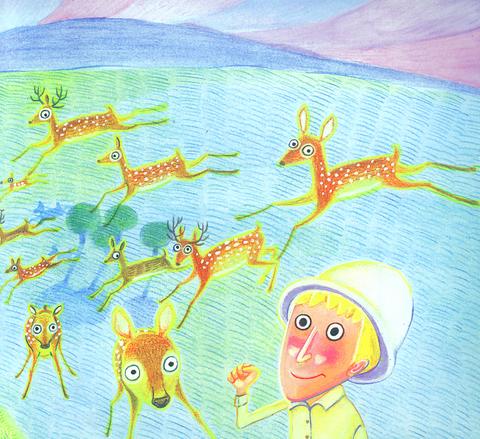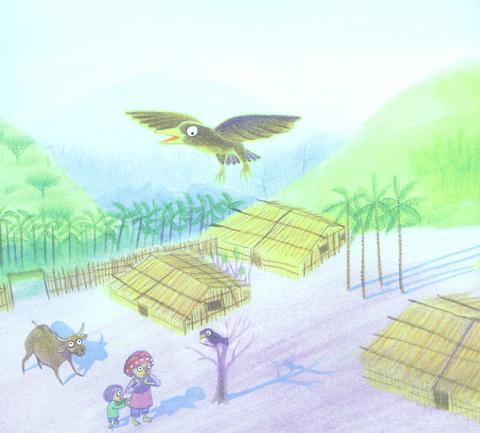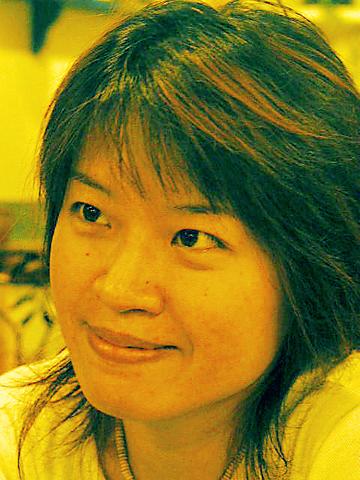Growing up, Taiwanese kids hear about Peter Pan, Sleeping Beauty, the Monkey King and plenty of other fairy tales and myths, but none of these stories are rooted in Taiwan. A new album by Wind Records (
Vu Vu is the Pingpu tribe's word for ancestor and the tale that is narrated to a modern-day Pingpu child tells of a Dutch merchant who came to Formosa many centuries ago and visited 10 of the island's tribes. At each settlement, the tribe's members share with their foreign guest one of their myths that reveals the unique culture of each tribal group.

Vu Vu's Tales was written and narrated by Sakinu, an Aboriginal author of children's books and junior high school textbooks on Aboriginal history who is also himself a descendent of Dutch merchants.

"All the stories are real Aboriginal myths that have been handed down through the millennia by oral tradition," said Jing Peng (
The album is published in a hard-backed picture book the size of a regular CD case. Inside are 24 pages with illustrations of the myths and 50 more pages containing the full-length written versions of the myths that are narrated on the second CD for people to read along to. Sakinu recounts the story in slightly accented Mandarin and the accompanying text is printed in Mandarin, with bopomofo used in spots spell out terms in Aboriginal languages.

PHOTO: MAX WOODWORTH, TAIPEI TIMES
Vu Vu's Tales is Wind Records' first foray into children's music, having until now focused almost entirely on the publication of New Age, Taiwanese Aboriginal music and the traditional music of China's minority peoples.
But despite this, it's not much of a departure from the label's long-standing work in the preservation and promotion of local cultures.
In Taiwan, the turn to material intended for children carries with it the weight of politics surrounding the localization of children's education.
"It's not explicit, but there is an undeniable political side to this album in the way it takes a Taiwan-centered view in telling stories that can be used for children's education. Before, education was always China-centered, and that's only recently starting to change," Peng said. "This means that adults reading these stories to their children will probably be hearing them for the first time themselves." Sakinu's stories are idyllic and certainly do not contain the interplay of good and evil of many Western fairy tales.
For starters, the Aborigines seem to all eagerly embrace and welcome the Dutch traveler, who in the illustrations looks like Tintin with a pith helmet. There's also none of the war and savagery that characterized relations between the Aborigines and Han Chinese settlers, except for one passage in which the Chinese are carrying out slash-and-burn landscaping of Aborigines' sacred hunting grounds.
For the most part, the stories teach a small and idealized portion of the cosmology or moral foundations of the Tao, Atayal, Rukai, Amis, Bunun, Saisiat, Pingpu, Paiwan, Puyuma and Tsou tribes. They also manage to avoid becoming overly didactic or riddled with the stereotypes typically thrust upon Aborigines, though there is the occasional appearance of a drunk tribesman and the spontaneous burst into song and dance.
"It's a very naive tale written mostly for kids. The educational aspect is unavoidable because this type of project is the first of its kind and most people don't know these stories, but they're meant for kids' enjoyment. The hope is that these stories or stories like them can become part of Taiwanese children's upbringing," said Moro (莫侯), the album's illustrator.
Students of Mandarin will find an unintended use for the album with the abbreviated versions of the stories on the illustrated pages and the read-along, full-length story at the back.
The album's biggest flaw, though, aside from the fact that the track numeration on the back cover doesn't match the actual tracks on the second CD, is that the text does not follow the narration character by character, but instead skips certain passages.

On April 26, The Lancet published a letter from two doctors at Taichung-based China Medical University Hospital (CMUH) warning that “Taiwan’s Health Care System is on the Brink of Collapse.” The authors said that “Years of policy inaction and mismanagement of resources have led to the National Health Insurance system operating under unsustainable conditions.” The pushback was immediate. Errors in the paper were quickly identified and publicized, to discredit the authors (the hospital apologized). CNA reported that CMUH said the letter described Taiwan in 2021 as having 62 nurses per 10,000 people, when the correct number was 78 nurses per 10,000

As we live longer, our risk of cognitive impairment is increasing. How can we delay the onset of symptoms? Do we have to give up every indulgence or can small changes make a difference? We asked neurologists for tips on how to keep our brains healthy for life. TAKE CARE OF YOUR HEALTH “All of the sensible things that apply to bodily health apply to brain health,” says Suzanne O’Sullivan, a consultant in neurology at the National Hospital for Neurology and Neurosurgery in London, and the author of The Age of Diagnosis. “When you’re 20, you can get away with absolute

May 5 to May 11 What started out as friction between Taiwanese students at Taichung First High School and a Japanese head cook escalated dramatically over the first two weeks of May 1927. It began on April 30 when the cook’s wife knew that lotus starch used in that night’s dinner had rat feces in it, but failed to inform staff until the meal was already prepared. The students believed that her silence was intentional, and filed a complaint. The school’s Japanese administrators sided with the cook’s family, dismissing the students as troublemakers and clamping down on their freedoms — with

As Donald Trump’s executive order in March led to the shuttering of Voice of America (VOA) — the global broadcaster whose roots date back to the fight against Nazi propaganda — he quickly attracted support from figures not used to aligning themselves with any US administration. Trump had ordered the US Agency for Global Media, the federal agency that funds VOA and other groups promoting independent journalism overseas, to be “eliminated to the maximum extent consistent with applicable law.” The decision suddenly halted programming in 49 languages to more than 425 million people. In Moscow, Margarita Simonyan, the hardline editor-in-chief of the